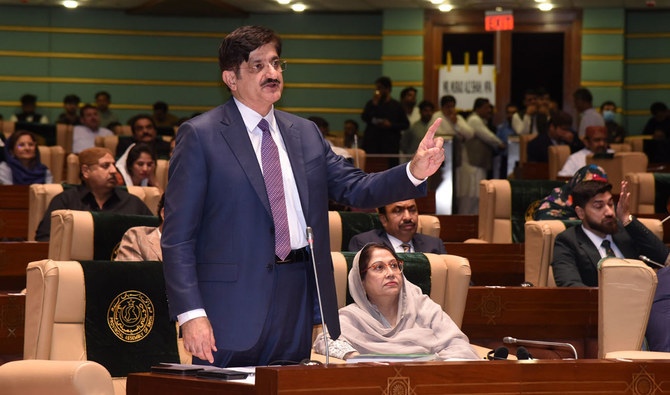KARACHI: The provincial assembly in Pakistan’s southern Sindh province elected on Monday Murad Ali Shah, a professional engineer and banker who graduated from Stanford University, as the chief minister of the province for the third term.
Shah, whose father Abdullah Shah also served as the chief minister, was first elected for the top provincial office in 2016, when his party removed veteran politician, Qaim Ali Shah, from the post after criticism over his way of administering the province. In 2018, Shah was again elected as the chief minister after his Pakistan Peoples Party (PPP) won majority in the province. He served on the post until August last year.
In the Feb. 8 national election, the PPP once again bagged the highest 84 provincial seats and nominated Shah as the candidate for CM’s office. In Monday’s election, he secured 112 votes in the 168-member House, while his opponent, Ali Khurshidi, from the Muttahida Qaumi Movement-Pakistan (MQM-P) secured 36 votes.
After being elected as the CM, Shah said he would take along all political parties, including the MQM-P that fielded a candidate against him, and the Jamaat-e-Islami (JI) and ex-PM Khan-led Pakistan Tehreek-e-Insaf (PTI) opposition parties.
“We are never scared of criticism, no one is perfect... if you don’t criticize, then how we will learn,” he said, addressing Khan-backed independent candidates in the House. “I want to thank people on both sides [treasury and opposition] and also the people of this province.”
Shah promised to address the “immediate challenges” of militancy, rampant street crime and bandits hiding in riverine areas of the province, saying it would be a priority of his government.
The newly elected chief minister of Sindh is a seasoned politician with a diverse background in engineering and finance.
Born in the provincial capital of Karachi in August 1962, Shah acquired his early education from the St. Patricks High School and a Bachelor’s degree in Civil Engineering from the NED University of Engineering and Technology. He pursued dual Masters of Science degrees in Civil-Structural Engineering and Engineering Economic Systems from Stanford University in California.
Shah has an extensive experience of working in both public and private sectors in Pakistan, UK, Kuwait, and the US from 1986 to 2002. He worked as an engineer at multiple positions before becoming an investment banker at prestigious institutions like Citibank and the Gulf Investment Corporation.
In 2002, Shah ventured into politics and has since excelled in navigating the tricky arena, winning five provincial assembly elections and holding key provincial portfolios like revenue, irrigation, finance, energy and planning and development.
His election to the CM’s office came two days after the provincial assembly in Sindh held its inaugural session, amid protests by opposition parties over alleged rigging of the election. On Sunday, Shah’s party had Owais Qadir Shah and Anthony Naveed elected as speaker and deputy speaker of the House.


















